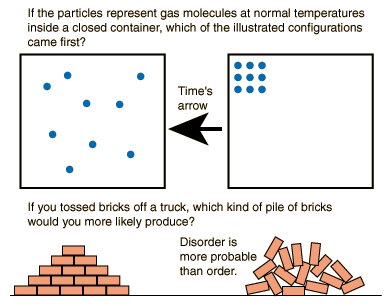Understanding of Gravity
The Third Revolution about Gravity: It doesn't exist!
- Newton's idea of gravity doesn't provide an underlying reason for
why it exists (in fact, it had a serious problem). Einstein did
much better, but still it doesn't say why mass warps spacetime but just
that it does.
- There's an idea that gravity is an entropic force, or an
emergent property. Thus, it is not a real force at all but
a side-effect of other fundamental properties.
- This idea started primarily with Bekenstein and Hawking, then
later with Sakharov, Padmanabhan, and recently popularized by Verlinde.
- To understand this, we first have to discuss entropy.
- ENTROPY: an important concept in physics is that physical systems
tend to evolve towards states of higher disorder. A measure of this
quantity is called entropy.
- High entropy states have high disorder. A way to measure this is to
determine how many rearrangements could happen without having an
obvious effect. The more rearragements possible, the higher the entropy.
- The increase in entropy for a physical system is a product of the Second
law of thermodynamics.

- Entropy is an essential property to understand for astronomy. It
can tell us how stars orbit in a galaxy, why black holes exist, why
time moves in one direction, and why our universe comes from
the big bang.
- Entropic forces: there are apparent forces that can be thought of as
resulting from entropy. The classic one is elasticity: a stretched rubber
band wants to contract because the molecules want to be more disordered.
- Gravity: if entropy governs how masses interact, then gravity is
simply a consequence of a physical system's need to have more disorder.
